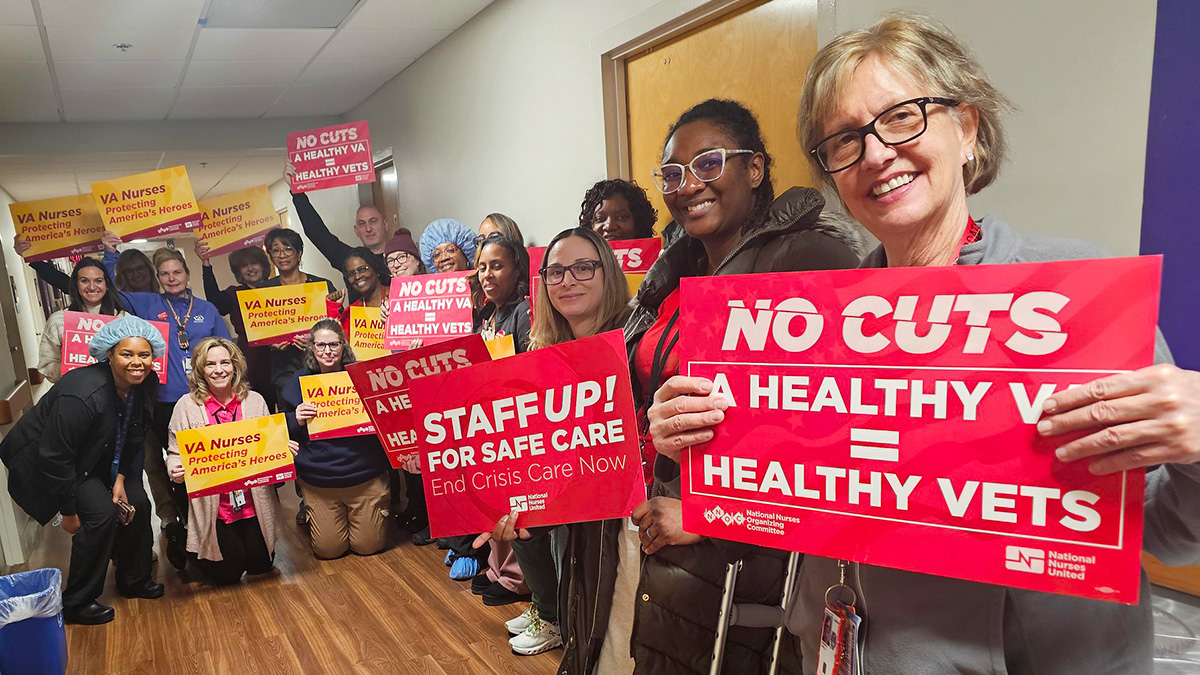Press Release
National Nurses United applauds the reintroduction of the VA Employee Fairness Act Bill ensures full collective bargaining rights for nurses and other VA clinicians

Bill ensures full collective bargaining rights for nurses and other VA clinicians
National Nurses Organizing Committee/National Nurses United (NNOC/NNU) applauds Sen. Tammy Duckworth (D-IL) and Rep. Mark Takano (D-CA) on the reintroduction of the VA Employee Fairness Act, a federal bill that would ensure full collective bargaining rights for nurses and other clinicians in the Veterans Health Administration (VHA). Nurses know that union representation and full bargaining rights are an essential part of ensuring that our nation’s heroes receive the highest quality care possible. Nurses from NNOC/NNU will be in Washington, D.C. meeting with lawmakers on Wednesday, May 7, 2025 to lobby for the passage of this important bill.
This bicameral reintroduction comes amid one of the most egregious attacks on federal-sector collective bargaining rights. President Trump’s executive order seeking to strip federal employees, including the 15,000 registered nurses in the VA represented by NNOC/NNU, of their protected union rights is strongly opposed by nurses who vow to fight the order. Members of Congress from both sides of the aisle have called on the president and VA Secretary Doug Collins to reinstate these bargaining rights in an April 2nd letter, and in another on April 17th. VA nurses rely on collective bargaining to advocate for patient safety and ensure the best care for our veterans, and that’s why NNU has joined with other federal-sector unions to challenge this executive overreach in the courts.
“The VA Employee Fairness Act would repeal provisions in Section 7422 that limit collective bargaining rights and brings the rights of VA nurses in line with nurses in Department of Defense health care facilities, other unionized federal employees, and nurses in the private sector,” said Irma Westmoreland, RN, and chair of Veterans Affairs for NNU. “By granting VA nurses the ability to bargain collectively on issues related to patient care, the VA Employee Fairness Act would make the VA a safer place both for nurses and our veterans. VA nurses are fierce advocates for veterans and ensuring our full union rights empowers us as we fulfill this most sacred duty.”
"VA health care employees work tirelessly to provide high-quality care to our nation's veterans and their families,” said Rep. Takano, the ranking member of the House Committee on Veterans’ Affairs. “The VA Employee Fairness Act would grant these indispensable workers the collective bargaining rights they deserve and have been fighting for, while improving VA employee retention. Passing this bill is the right thing to do. This legislation is more critical than ever, given the administration's efforts to fire VA employees and make cuts that continue to diminish VA employee morale."
“This Administration cannot continue to slash and burn the VA in the dark,” said Sen. Duckworth, a member of the Senate Committee on Veterans’ Affairs. “As DOGE cuts continue, it’s as urgent as ever that Congress empowers VA health care professionals with the same bargaining rights and protections as other federal employees so they can speak out freely against any problems or challenges they’re enduring at this critical time for the VA.”
The VA Employee Fairness Act passed the House of Representatives during the 117th Session with bipartisan support and was introduced with eight original cosponsors in the Senate and 75 in the House today.
Section 7422 of Title 38 of the U.S. Code contains broad restrictions to collective-bargaining rights for RNs and other clinical professionals over matters concerning professional conduct or competence (including direct patient care and clinical competence), peer review, and compensation. The VA Employee Fairness Act would give nurses the ability to advocate for safe nurse-to-patient ratios, to bargain for compensation and pension, and to provide crucial input when new procedures or policies are introduced. The ability to speak up over issues in the workplace and improve working conditions is a crucial part of clinician recruitment, retention, and quality patient care, issues which take on an even greater importance as RNs and health care workers in the VA are forced to navigate administrative actions like the above-mentioned executive order, along with VA Secretary Doug Collins’ attempts to massively cut the VA workforce to dangerously low levels. Without the ability for RNs to directly address these patient safety concerns in a bargaining agreement, the quality of patient care can deteriorate and serious problems in VHA facilities can go unaddressed.
“Nurses will never abandon their patients, and they will continue to fight for the best care for our nation’s veterans,” said Westmoreland. “That’s why we will continue to demand the restoration of our hard-fought union rights and for the expansion of our collective bargaining rights under the VA Employee Fairness Act.”
The VA Employee Fairness Act is also endorsed by the American Federation of Labor-Congress of Industrial Organizations (AFL-CIO), American Federation of Government Employees (AFGE), the National Federation of Federal Employees (NFFE), the International Federation of Professional and Technical Engineers (IFPTE), Service Employees International Union (SEIU), the American Federation of State, County, and Municipal Employees (AFSCME), and the National Association of Government Employees (NAGE-SEIU).[HB1] [HB2]
NNU represents 15,000 registered nurses at 23 VA facilities across the country, many of whom are veterans themselves.
National Nurses United is the largest and fastest-growing union and professional association of registered nurses in the United States with more than 225,000 members nationwide. NNU affiliates include California Nurses Association/National Nurses Organizing Committee, DC Nurses Association, Michigan Nurses Association, Minnesota Nurses Association, and New York State Nurses Association.